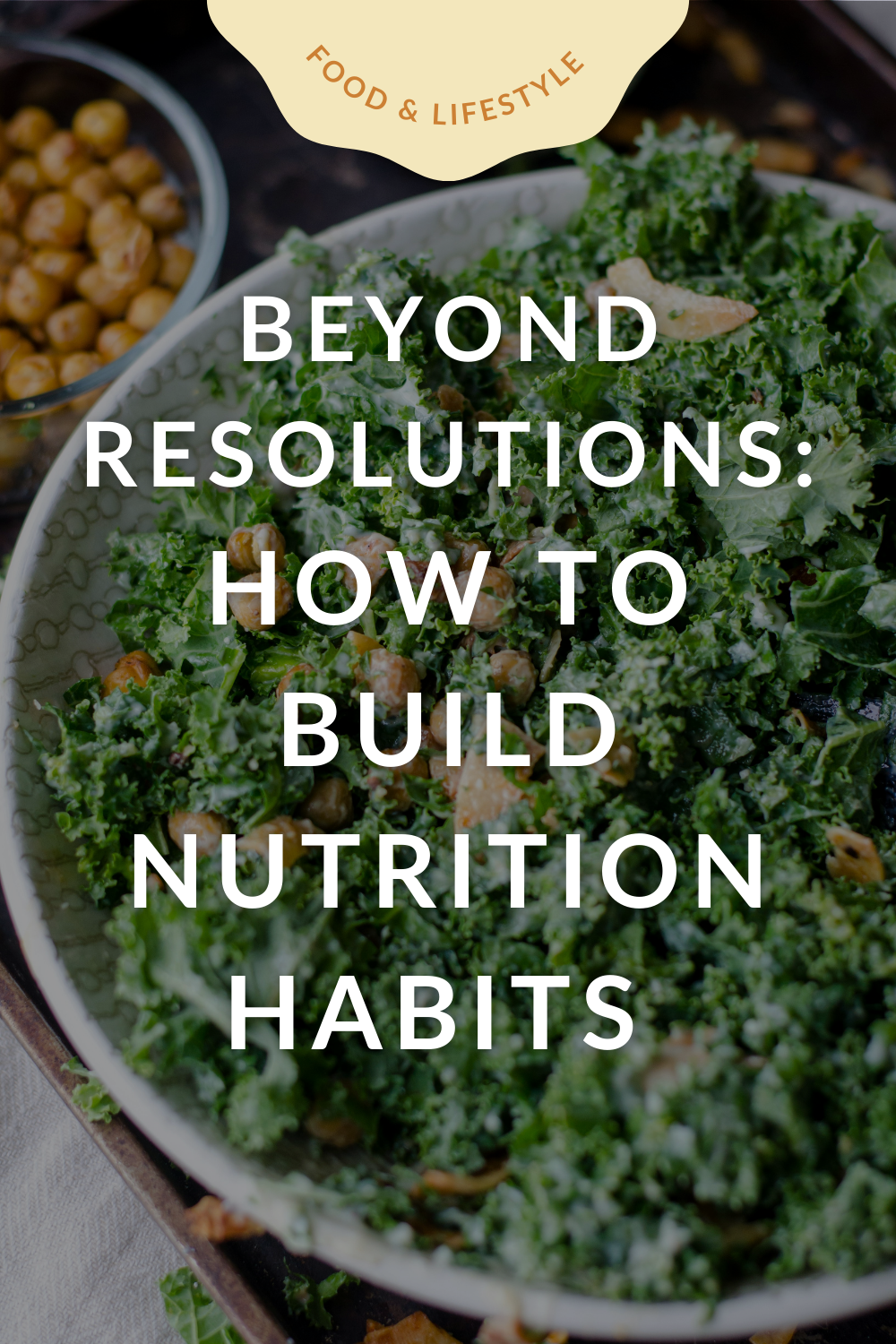Beyond Resolutions: How to Build Nutrition Habits
Picture this: It’s January 1st. You’re armed with a shiny new meal plan and a fresh set of goals, determined that this is finally the year you’ll stick to your resolutions. But by mid-February, life gets busy, motivation fades, and that once-enthusiastic “new year, new me” energy has all but disappeared. Sound familiar?
If you’re tired of this pattern, you’re not alone. And here’s the thing - there’s nothing wrong with you. The problem lies in how resolutions are often set: overly ambitious, rooted in all-or-nothing thinking, and disconnected from what truly works for you.
But what if, instead of focusing on resolutions, you focused on building sustainable habits? Habits that support your well-being, fit into your lifestyle, and don’t rely on constant willpower? But rather, having systems in place that hold you together and accountable.
That’s exactly what we’re exploring today. We’ll cover why traditional resolutions don’t work for most people, how to shift your mindset to focus on sustainable habit-building and five practical strategies for creating nutrition habits that last.
So, grab a cup of tea, get cozy, and let’s dive in!
Why New Year Resolutions May Fall Short
A common pitfall is that they are based on unrealistic expectations or external pressures. For example, “I’ll cut out all added sugar” or “I’ll go to the gym every single day.” These goals are rigid and don’t allow for life’s inevitable ups and downs.
Another common pitfall? Resolutions are often focused on what you don’t want rather than what you do want. Focusing on what you’re rejecting, and not what you’re adding or replacing it with, doesn’t provide you with a clear, actionable plan (plus, it’s not very fun).
For example, if your goal is to “Stop wasting time on social media,” that’s great! But why? What are you trying to achieve in place of this, what would you like to gain? Perhaps, it’s “Spend more time doing things that bring me joy and fulfillment.” Another example of this reframe, nutrition-wise is, from “Stop snacking late at night,” to “Enjoy nourishing and satisfying meals that leave me feeling great throughout the day.”
This isn’t to say goal-setting isn’t helpful - it’s just that we need to approach it differently if you want to see it through.
Mindset Shift: From New Year Resolutions to Nutrition Habits
We work with many patient populations, collaborate with various providers from endocrinologists to therapists to personal trainers....and if there's one thing that's stayed consistent theme through all these relationships and cases, it's this:
Nutrition isn't about following strict diets or doing everything perfectly. It's about finding balance, listening to your body, and making choices that align with your wellbeing. Small, consistent changes can add up over time, and being kind to yourself when things don't go as planned is just as important as the healthy habits you're building. It's all about progress, not perfection!
And as we look to the new year, I encourage you to focus on the long-term journey and what makes you feel truly aligned - not bound by rigid rules or unrealistic expectations.
Next, connect your habits to your values. Ask yourself: What’s important to me about my health? How do I want to feel in my daily life?
When your habits align with your deeper values, they feel more meaningful and are easier to stick with.
Practical Strategies for Sustainable Nutrition Habits
Here are three strategies to help you build sustainable nutrition habits:
1.Set realistic expectations and timelines.
When you're motivated to make changes to your nutrition, it's tempting to expect instant changes in your behaviour and quick results. However, lasting success is built on setting realistic goals and understanding that meaningful change takes time, and knowing that progress can look like many different things. Focusing on gradual improvements rather than immediate perfection will set you up for success in the long run.
For example, if your goal is to get a handle on managing PCOS symptoms, it’s important to understand that regulating your blood sugar levels and reducing inflammation doesn’t happen overnight. It could take several weeks - or even a few months - before you start noticing significant improvements like more stable energy levels, fewer cravings, more regular cycles, less pain and improvements in blood work.
If your goal is to reduce bloating or digestive discomfort, it might take time to pinpoint specific triggers, adjust meals accordingly and monitor for improvements. Or, it may take time to eventually reintroduce foods and diversify your intake again.
Set yourself up for success by celebrating the small wins, like sticking to a new routine for a week, and allow yourself the flexibility to make adjustments as needed! By setting realistic expectations and giving yourself ample time to adjust, you’ll reduce feelings of frustration and be better able to stay motivated when challenges arise.
2.Start small and build gradually
One of the biggest slipups I see is people trying to overhaul their entire dietary habits and lifestyle at once. Instead of setting five or six massive goals, start with just one or two small, manageable habits.
For example, if you struggle with chaotic eating patterns during the day, start by eating breakfast within an hour or two of waking up. It might be something simple, like Greek yogurt with berries or a hard-boiled egg and toast.
Then, maybe the next goal is having a balanced lunch during busy work days. Then, perhaps we tackle hydration. Then, adding a supplement routine, and so on, and so forth.
3. Plan for imperfection
Being kind to yourself when things don’t go as planned is just as important as the habits you’re trying to build.
Life happens, and that’s okay! We all have days when things don't go as planned - whether it's a surprise work deadline, feeling under the weather or just needing a mental health break.
The important thing is not letting one “off” day derail your progress or make you feel like you've failed (which, you didn’t). Progress isn't about being perfect every day; it's about showing up consistently over time.
Eating is fluid and an ongoing practice - I like to compare it to brushing your teeth. If you forget to brush one night, you don’t beat yourself up, stress over it, or over-compensate by brushing ten times the next day.You just pick up your toothbrush the next morning and keep going.
This same approach applies to eating or any health-promoting habit!.
4. Align your habits with your lifestyle
Your habits should align with your unique needs and lifestyle.
For example, if meal prep feels overwhelming or you don’t have the space and capacity to do it once per week, don’t force yourself into spending hours in the kitchen on Sundays. Instead, try batch-cooking a few ingredients - like a protein and a grain - to mix and match during the week.
Or, if you’re always on the go, rather than aiming for homemade meals every day, keep pre-packed snacks and convenient yet balanced meals in the car. This can be wraps and sandwiches, pre-mixed salads, roasted legumes, canned tuna and whole grain crackers, hard boiled eggs, fruits and vegetable sticks or portable smoothies.
The key is to make your habits feel realistic and flexible! Small changes in your environment can make it easier to follow through on your intentions.
5. Celebrate all wins, big and small
One of the most important aspects of building sustainable nutrition habits is acknowledging and celebrating your progress. Often, we focus so much on the end goal that we forget to appreciate the steps along the way. As cheesy as it sounds, it’s really about the journey (there is no end-point to eating well, right?).
For example, if you added two more homemade meals a week - that’s a huge accomplishment! Or maybe you swapped out your second afternoon coffee for a protein and fibre rich snack and felt energy levels are more stable - definitely something to celebrate.
Celebrating your wins helps reinforce positive behaviors. You could take a moment at the end of each day to reflect on what went well, or write down your achievements in a journal. This helps you stay focused on the progress you've made, rather than fixating on what you haven't yet achieved.
Final Thoughts
As we wrap up, remember this: building sustainable habits isn’t about grand, sweeping changes or relying on sheer willpower. It’s about setting realistic goals, starting small and creating routines that fit into your unique lifestyle. Focus on habits that feel achievable and enjoyable, rather than chasing perfection or trying to do too much at once.
Being kind to yourself when things don’t go as planned is just as important as the habits you’re trying to build. The key is consistency and flexibility - allowing your habits to evolve as your needs and circumstances change.
Have a happy 2025!
Hi! I’m Trista
A Registered Dietitian and reproductive health expert. I’m here to help you gain confidence to overcome your Polycystic Ovary Syndrome and digestive health woes, while bettering your relationship with food.
CATEGORIES
Ready to build lasting habits?
Our 1-on-1 Nutrition Coaching Programs provide the personalized support and structure you need to create sustainable eating habits that truly stick. Discover how to boost your energy, regulate your periods, balance blood sugars, and finally say goodbye to bloating—for good.















